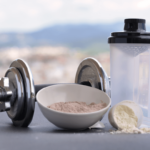Are you feeling sluggish, low on energy, or noticing changes in your mood? These could be signs of low testosterone.
This vital hormone isn’t just about muscles and sex drive; it affects both men and women’s overall health. Discover how to give your testosterone levels a natural boost without relying on medications.
Learn simple strategies that could make a significant difference in your energy levels, mental clarity, and well-being!

Jump to:
Importance of Testosterone
Testosterone, a steroid hormone predominantly produced in the testicles and ovaries, and in smaller amounts by the adrenal glands, is a cornerstone of puberty and physical development in those assigned male at birth.
It drives changes such as increased muscle mass, voice deepening, and hair growth. For those assigned female at birth, it exists in lower levels but is equally vital.
Throughout adulthood, maintaining balanced testosterone levels is crucial for health, impacting disease risk and sexual functionality.
Understanding Testosterone Ranges
Testosterone levels naturally fluctuate throughout life. Additionally, laboratory results can vary slightly between different facilities.
However, to provide a general understanding, typical testosterone levels are often measured in nanograms per deciliter (ng/dL). While ranges can differ by age and gender,
it’s essential to consult a healthcare professional for an accurate interpretation of your individual results.

Recognizing Low Testosterone
Sometimes our bodies offer subtle clues that testosterone levels may be lower than optimal.
Common signs in both men and women can include decreased energy levels, persistent low mood, changes in sexual desire, reduced muscle mass, or difficulty concentrating.
If you experience several of these symptoms, it’s a good idea to discuss them with your doctor.
Methods to Increase Testosterone Naturally
Regular Exercise
Exercise isn’t just good for overall health; it’s also one of the most effective natural testosterone boosters.
Particularly, resistance training like weightlifting and high-intensity interval training (HIIT) have shown great promise in temporarily boosting testosterone levels.
Studies confirm that individuals engaged in regular physical activity have higher testosterone levels compared to their inactive counterparts.
Balanced Diet
What you eat impacts not only your health but also your hormone levels. Ensuring your diet includes sufficient protein and healthy fats can help maintain robust testosterone levels.
Conversely, erratic eating patterns can disrupt your hormonal balance. Thus, a balanced diet rich in whole foods and nutrients supports both your general health and hormone regulation.
Maintain a Healthy Weight
Maintaining a healthy weight is an essential pillar in supporting overall well-being, including optimal hormone levels.
Carrying excess weight can negatively impact testosterone production. If you are struggling with weight management, a qualified healthcare provider can work with you to develop a personalized and safe weight-loss plan to help restore healthy hormone balance.
Stress Management
The relationship between stress and hormone levels is inversely proportional; high stress means lower testosterone levels due to elevated cortisol.
Effective stress management, therefore, can help maintain healthy testosterone levels. Techniques include regular physical activity, sufficient sleep, and practicing relaxation methods like meditation or yoga.
Optimize Vitamin D Levels
Vitamin D deficiency is linked to lower testosterone levels. Ensuring adequate vitamin D through sunlight exposure or supplements can potentially boost testosterone.
The exact relationship between vitamin D and testosterone is still under research, but optimizing your vitamin D levels is generally beneficial for health and well-being.
Consider Supplements
Supplements can also play a role in enhancing testosterone levels. Zinc, for example, has been shown to increase testosterone in individuals with zinc deficiency.
While some herbal supplements like ginger and ashwagandha are suggested to boost hormone levels, always consult with a healthcare provider before starting any new supplement regimen.
Quality Sleep
Sleep is as crucial as diet and exercise in maintaining healthy testosterone levels. Research indicates that restricted or disrupted sleep can significantly lower testosterone in men.
Striving for 7 to 9 hours of quality sleep nightly can help preserve your hormone levels and enhance overall health.
Reduce Exposure to Estrogen-Like Chemicals
Chemicals in the environment that mimic estrogen can adversely affect your hormone levels.
Reducing exposure to substances like BPA and parabens, commonly found in plastics and some cosmetics, may improve your testosterone levels.
Moderate Alcohol Intake
The link between alcohol and testosterone is complex. Excessive drinking can lead to a decrease in testosterone levels and adversely affect liver health, which is crucial for hormone regulation.
Moderating alcohol intake is a practical step towards maintaining healthy testosterone levels.
When Supplements Aren’t Enough – Medical Therapies
For individuals with significantly low testosterone levels that persist despite lifestyle changes, medically prescribed testosterone therapy might be an option.
Available in various forms, including gels, injections, or patches, these therapies are designed to restore testosterone levels to a normal range.
However, medical hormone treatment should always be initiated and monitored closely by a qualified healthcare provider.
Conclusion
Maintaining optimal testosterone levels involves a holistic approach encompassing diet, exercise, stress management, and more.
By integrating these natural strategies into your daily routine, you can enhance your health and hormone balance, leading to improved quality of life and well-being.
Sources:
- Amore M, et al. (2012). Partial androgen deficiency, depression, and testosterone supplementation in aging men.
https://www.ncbi.nlm.nih.gov/pmc/articles/PMC3376477/ - Eisenberg ML. (2015). Testosterone replacement therapy and prostate cancer incidence.
https://wjmh.org/DOIx.php?id=10.5534/wjmh.2015.33.3.125 - Evaluation and management of testosterone deficiency. (2018).
https://www.auanet.org/guidelines/testosterone-deficiency-(2018) - Hua JT, et al. (2017). Effects of testosterone therapy on cognitive function in aging: A systematic review.
https://www.ncbi.nlm.nih.gov/pmc/articles/PMC5079177/ - Loeb S, et al. (2017). Testosterone replacement therapy and risk of favorable and aggressive prostate cancer.
https://ascopubs.org/doi/10.1200/JCO.2016.69.5304 - Testosterone, total, bioavailable, and free, serum. (n.d.).
http://www.mayomedicallaboratories.com/test-catalog/Clinical+and+Interpretive/83686 - Testosterone — what it does and doesn’t do. (2019).
https://www.health.harvard.edu/drugs-and-medications/testosterone–what-it-does-and-doesnt-do - Total testosterone. (n.d.).
https://www.urmc.rochester.edu/encyclopedia/content.aspx?contenttypeid=167&contentid=testosterone_total - Tyagi V, et al. (2017). Revisiting the role of testosterone: Are we missing something?
https://www.ncbi.nlm.nih.gov/pmc/articles/PMC5434832/














